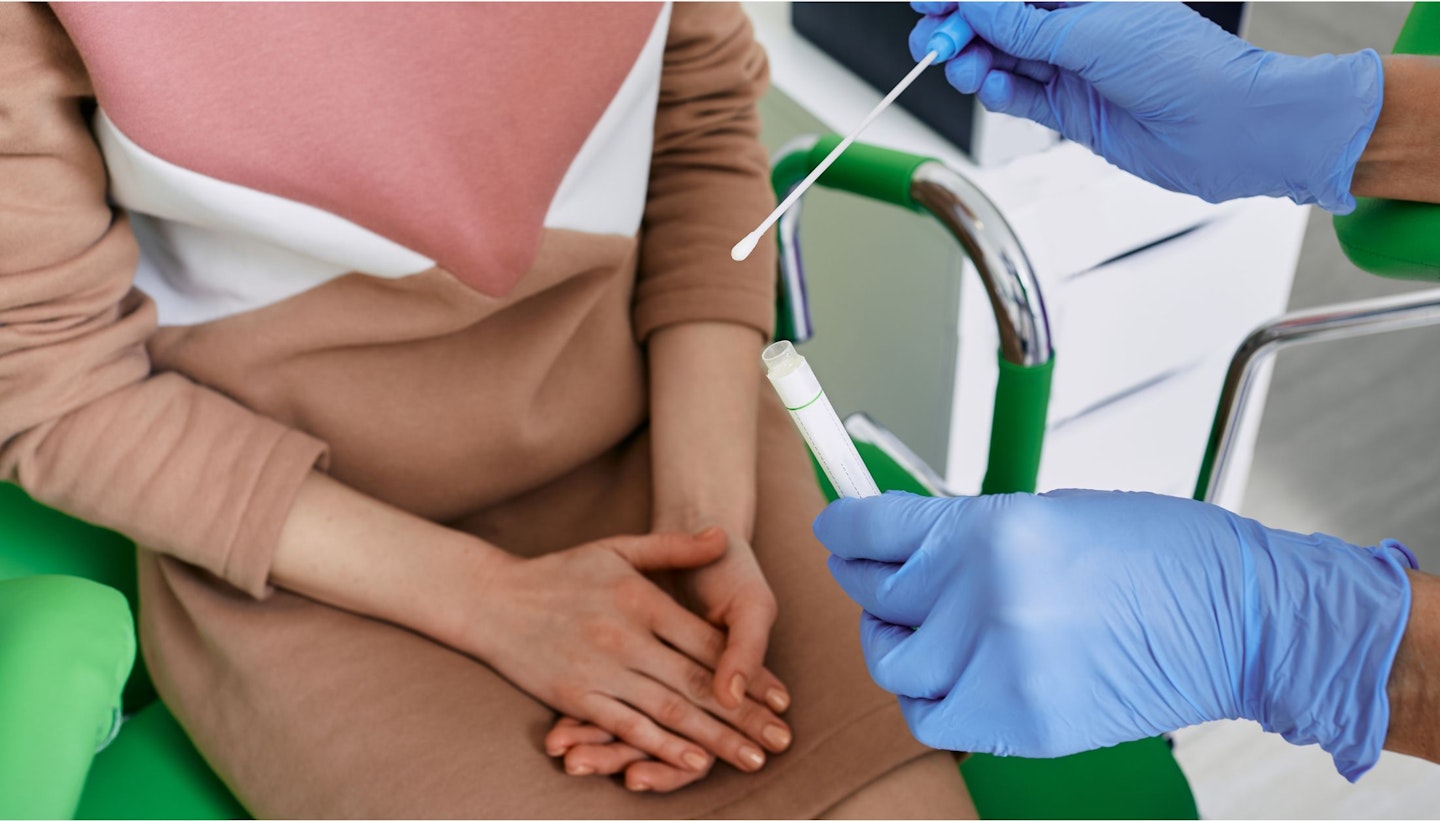Cervical Cancer Prevention Week 2025 is a timely reminder of the importance of being proactive and aware when it comes to our health. As mums, it's easy to place ourselves and our own health lower down the priority list, but Cervical Cancer Prevention Week reminds us that this is a highly preventable cancer, providing we take the right steps.
Taking place from 22nd - 28th January 2025, Cervical Cancer Prevention Week is an opportunity to learn about how to prevent cervical cancer, how to prepare for a smear test, and to spread awareness about the disease that affects 3,300 new women every year, according to statistics from Cancer Research UK.
What is Cervical Cancer?
According to the NHS, Cervical Cancer is a cancer that's found in the cervix and is most common in women between 30-35, but can affect women and people with a cervix of any age. The cervix is the opening between the vagina and the womb, often called the neck of the womb.
Nearly all cervical cancer is caused by an infection from Human Papillomavirus and children age 12-13 are now offered a HPV vaccine on the NHS to protect against this.
Cancer Research UK notes that "99.8% of cervical cancer cases in the UK are preventable" and you can reduce your risk of cervical cancer by having cervical screening which aims to spot changes in the cells in your cervix before they turn into cancer.
Cervical cancer usually develops slowly and Cancer Research UK's statistics show that "almost 9 in 10 (86.8%) women in England diagnosed with cervical cancer aged 15-44 survive their disease for ten years or more".
Symptoms of Cervical Cancer
Early cervical cancer doesn't tend to have any symptoms, which is one of the reasons why the work of Cervical Cancer Prevention Week is so important. Regular screenings are one of the main ways of catching cervical cancer either early, or even before it's got to that point.
If they do occur, the most common symptoms of cervical cancer are:
• Unusual vaginal bleeding i.e. between periods, after sex, after menopause, or heavier periods than normal
• Pain or discomfort during sex
• Changes to vaginal discharge
• Pain in your lower back, in the area between the hip bones (pelvis), or lower tummy
It's important to bear in mind that these symptoms are common and can be a result of other conditions, for instance fibroids or endometriosis. Regardless, if any of these symptoms are unusual for you, speak to your GP to find out what might be happening.

How to prevent cervical cancer
As Cervical Cancer Prevention Week 2025 highlights, prevention is key in the fight against cervical cancer which is one of the few cancers to have a preventative test. The week was set up in honour of Jade Goody who died at the age of cervical cancer in 2009 at the age of 27. Following her death, there was a rise in the number of women being screened for cervical cancer, which was dubbed 'the Jade Goody effect'. But unfortunately that number is decreasing and according to the NHS, a third of eligible under 50s didn't have their smear test in 2023. They're urging more women to "take up the potentially lifesaving offer" which is simple, quick, and could save your life.
Steve Russell, Chief Delivery Officer and National Director for Vaccinations and Screening for NHS England, said, "we have set an ambitious target of eliminating cervical cancer within the next two decades – one of the few countries in the world who have committed to this – and we are doing everything we can to achieve our ambition by making it as easy as possible to make appointments, and continuing to send invites and reminders to all eligible women."
As "one of the most preventable and treatable forms of cancer" (WHO), there are a number of steps you can take to protect yourself and give yourself the best chance of preventing cervical cancer.
1. Get vaccinated
The HPV vaccine is a game-changer in cervical cancer prevention. It is recommended for girls and boys between the ages of 12 and 13 and it's also available to other at risk groups so you can speak to your GP about getting vaccinated as an adult.
2. Regular cervical screening
Cervical screening, previously known as a Pap test or smear test, is essential for early detection. Women aged 25 to 64 are encouraged to attend cervical screening appointments regularly, usually every 3 to 5 years depending on age and location. These tests can detect abnormal cells before they turn into cancer, significantly increasing the chance of successful treatment.
3. Practise safe sexual health
Using barrier contraception methods like condoms can reduce the risk of HPV transmission but the NHS notes that "condoms can help protect you against HPV, but they do not cover all the skin around your genitals, so you're not fully protected."
4. Healthy lifestyle choices
Smoking can weaken your immune system, making it harder for the body to fight off HPV infections, and the chemicals in cigarettes can also cause cervical cancer so try to quit smoking.

Cervical screening
As mentioned, one of the most important things you can do to prevent cervical cancer is attend your cervical screening appointments when invited. These screening tests don't test for cancer but check for the presence of the human papillomavirus (HPV). HPV can cause cell changes in the cervix which have the potential to develop into cancer. But even if the test does detect HPV, try not to worry - not all HPV infections will cause cell changes, and not all cell changes will turn out to be cancerous. However, detecting this early gives doctors the best chance of monitoring changes and treating them if necessary.
Preparing for a smear test (cervical screening)
You'll be invited for your cervical screening (previously known as a smear test) once every 3-5 years (though this will be more regular if HPV or any cells changes are detected).
• During your appointment, the nurse will ask you to go behind a screen to remove your clothes from your waist down and lie on the bed with a sheet over your lower half.
• The nurse will ask you to bend your legs, put your feet together and lean your knees out to the sides.
• They'll put a speculum (smooth, tube-shaped tool) into your vagina and then open this so they can see your cervix and use a small brush to take a small sample of cells.
• They then remove the speculum and you can get dressed. The test should take less than 5 minutes.
While they're not as pleasant as a spa visit, cervical screening tests aren't painful (there might be a little scratching as they brush some of the cells) but could save your life. And while many women are embarrassed about the nurse getting close up 'down there', it's nothing they haven't seen before!
Getting the results of your cervical screening
The results should take a few weeks to come back but your nurse will tell you how long you can expect to wait at your appointment. The letter you receive is likely to tell you one of three things:
1. No HPV has been found and your risk of getting cervical cancer is low - you'll be invited back for another screening in 3-5 years.
2. HPV has been found (HPV positive), but no abnormal cell changes. You'll be invited for another screening in a year, followed by another a year later. If HPV is still present, you'll be asked to have a colposcopy.
3. If the test finds HPV and abnormal cell changes you'll be asked to have a colposcopy to investigate further.

Cervical cancer and fertility
If you're diagnosed with cervical cancer, you're likely to have questions around how treatment will affect your fertility. Treatment for cervical cancer can affect your fertility and cause early menopause so it's important to talk to your doctors if you are planning to start a family. There may be options available to you, either with treatment that can protect your fertility or access to fertility specialists who can discuss options such as having egg or embryo storage before treatment.
Cervical Cancer: Where to access support
If you've had a cervical screening test that has shown abnormal cell changes or have received a diagnosis of cervical cancer, your care team will support you and your family through the treatment process. There are also a number of dedicated charities who can offer information and support:
Cervical Cancer Prevention Week: the takeaways
As we've seen, cervical cancer is one of the few cancers that can be prevented with a simple test. If you haven't had a cervical screening in the past 3-5 years and think you might be due one, call your GP. The whole appointment will take 10 minutes, is easy to access and largely pain-free. But with research in the British Journal of Cancer finding that these screenings save at least 2,000 lives each year in the UK, this week is your sign to make your health a priority.
Frequently asked questions around cervical screening
Should I have cervical screening if I’m pregnant?
If you're pregnant you can usually delay your cervical screening until after thew birth but this does depend on your situation so check with your GP or midwife.
Do I have to have cervical screening if I've had the HPV Vaccine?
Yes, even if you've had the HPV vaccine, you should still take part in cervical screening. While the vaccine protects against the two types of HPV that cause most cases of cervical cancer, it doesn't protect against other types of HPV that are linked with cervical cancer.
About the author
Rebecca Lancaster is a Digital Writer for Mother&Baby, drawing on ten years of parenting her two children to help others navigating their own parenting journey. As a freelance writer, she spent ten years working with leading lifestyle brands, from travel companies to food and drink start-ups, and writing everything from hotel reviews to guides to the best British cheeses. She’s particularly interested in travel and introducing her children to the excitement of visiting new places, trying different foods (less successfully) and experiencing different cultures.
